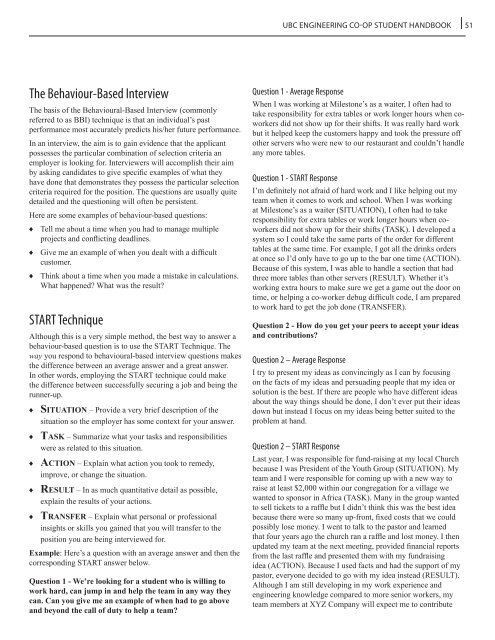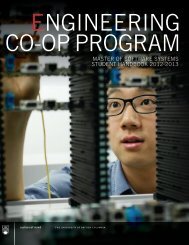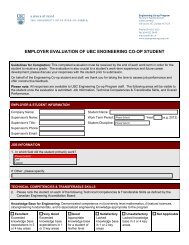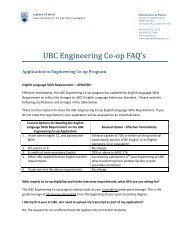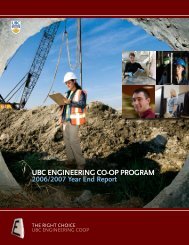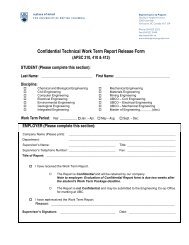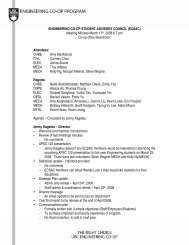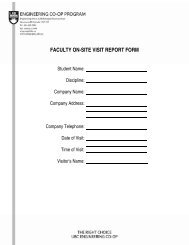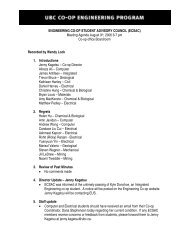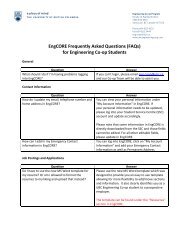ENGINEERING CO-OP PROGRAM
Download - Engineering Co-op Office - University of British Columbia
Download - Engineering Co-op Office - University of British Columbia
- No tags were found...
Create successful ePaper yourself
Turn your PDF publications into a flip-book with our unique Google optimized e-Paper software.
UBC <strong>ENGINEERING</strong> <strong>CO</strong>-<strong>OP</strong> STUDENT HANDBOOK 51<br />
The Behaviour-Based Interview<br />
The basis of the Behavioural-Based Interview (commonly<br />
referred to as BBI) technique is that an individual’s past<br />
performance most accurately predicts his/her future performance.<br />
In an interview, the aim is to gain evidence that the applicant<br />
possesses the particular combination of selection criteria an<br />
employer is looking for. Interviewers will accomplish their aim<br />
by asking candidates to give specific examples of what they<br />
have done that demonstrates they possess the particular selection<br />
criteria required for the position. The questions are usually quite<br />
detailed and the questioning will often be persistent.<br />
Here are some examples of behaviour-based questions:<br />
♦♦<br />
♦♦<br />
♦♦<br />
Tell me about a time when you had to manage multiple<br />
projects and conflicting deadlines.<br />
Give me an example of when you dealt with a difficult<br />
customer.<br />
Think about a time when you made a mistake in calculations.<br />
What happened? What was the result?<br />
START Technique<br />
Although this is a very simple method, the best way to answer a<br />
behaviour-based question is to use the START Technique. The<br />
way you respond to behavioural-based interview questions makes<br />
the difference between an average answer and a great answer.<br />
In other words, employing the START technique could make<br />
the difference between successfully securing a job and being the<br />
runner-up.<br />
♦♦<br />
♦♦<br />
♦♦<br />
♦♦<br />
♦♦<br />
SITUATION – Provide a very brief description of the<br />
situation so the employer has some context for your answer.<br />
TASK – Summarize what your tasks and responsibilities<br />
were as related to this situation.<br />
ACTION – Explain what action you took to remedy,<br />
improve, or change the situation.<br />
RESULT – In as much quantitative detail as possible,<br />
explain the results of your actions.<br />
TRANSFER – Explain what personal or professional<br />
insights or skills you gained that you will transfer to the<br />
position you are being interviewed for.<br />
Example: Here’s a question with an average answer and then the<br />
corresponding START answer below.<br />
Question 1 - We’re looking for a student who is willing to<br />
work hard, can jump in and help the team in any way they<br />
can. Can you give me an example of when had to go above<br />
and beyond the call of duty to help a team?<br />
Question 1 - Average Response<br />
When I was working at Milestone’s as a waiter, I often had to<br />
take responsibility for extra tables or work longer hours when coworkers<br />
did not show up for their shifts. It was really hard work<br />
but it helped keep the customers happy and took the pressure off<br />
other servers who were new to our restaurant and couldn’t handle<br />
any more tables.<br />
Question 1 - START Response<br />
I’m definitely not afraid of hard work and I like helping out my<br />
team when it comes to work and school. When I was working<br />
at Milestone’s as a waiter (SITUATION), I often had to take<br />
responsibility for extra tables or work longer hours when coworkers<br />
did not show up for their shifts (TASK). I developed a<br />
system so I could take the same parts of the order for different<br />
tables at the same time. For example, I got all the drinks orders<br />
at once so I’d only have to go up to the bar one time (ACTION).<br />
Because of this system, I was able to handle a section that had<br />
three more tables than other servers (RESULT). Whether it’s<br />
working extra hours to make sure we get a game out the door on<br />
time, or helping a co-worker debug difficult code, I am prepared<br />
to work hard to get the job done (TRANSFER).<br />
Question 2 - How do you get your peers to accept your ideas<br />
and contributions?<br />
Question 2 – Average Response<br />
I try to present my ideas as convincingly as I can by focusing<br />
on the facts of my ideas and persuading people that my idea or<br />
solution is the best. If there are people who have different ideas<br />
about the way things should be done, I don’t ever put their ideas<br />
down but instead I focus on my ideas being better suited to the<br />
problem at hand.<br />
Question 2 – START Response<br />
Last year, I was responsible for fund-raising at my local Church<br />
because I was President of the Youth Group (SITUATION). My<br />
team and I were responsible for coming up with a new way to<br />
raise at least $2,000 within our congregation for a village we<br />
wanted to sponsor in Africa (TASK). Many in the group wanted<br />
to sell tickets to a raffle but I didn’t think this was the best idea<br />
because there were so many up-front, fixed costs that we could<br />
possibly lose money. I went to talk to the pastor and learned<br />
that four years ago the church ran a raffle and lost money. I then<br />
updated my team at the next meeting, provided financial reports<br />
from the last raffle and presented them with my fundraising<br />
idea (ACTION). Because I used facts and had the support of my<br />
pastor, everyone decided to go with my idea instead (RESULT).<br />
Although I am still developing in my work experience and<br />
engineering knowledge compared to more senior workers, my<br />
team members at XYZ Company will expect me to contribute


